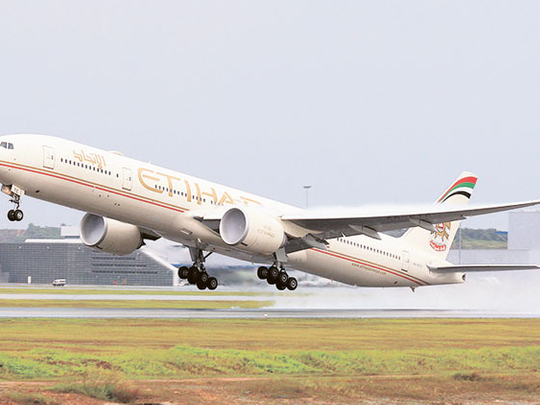
Dubai: Gulf airlines will start charging customers additional fees from as early as March 1 to cover the new carbon tax — Emissions Trading Scheme (ETS) — imposed by the European Union.
Etihad Airways Monday said it will increase the fuel surcharge of $3 (Dh11) per passenger for flights into and out of Europe and $0.03 per kg for cargo shipments on its European flights to offset the ETS costs being imposed on the airline by the European Union. The increase will take effect for travel from March 1.
"The charges are calculated based on the additional cost to Etihad for the carbon credits the airline will be required to purchase for 2012 in order to comply with the EU ETS. As carbon prices fluctuate, this cost may need to be adjusted from time to time," Etihad said in a statement.
No airline will face a bill until next year, after this year's carbon emissions have been calculated. Initially airlines will be handed allowances to cover 85 per cent of their emissions. Each allowance represents a tonne of carbon pollution.
Penalties
Under the scheme, airlines that do not comply may face European fines of €100 ($130) for each tonne of carbon dioxide emitted for which they have not surrendered allowances. In the case of persistent offenders, the EU has the right to ban airlines from its airports.
Gulf carriers, including Emirates and Etihad, said they will pass this on to the passengers.
"Emirates estimates that in 2012 alone, it will cost the airline over €40 million to purchase additional emissions allowances to comply with the scheme and well over half a billion euros in the nine-year period to 2020. Unfortunately, this cost will almost certainly have to be passed to customers," an Emirates spokesperson said.
The European Commission says the scheme is needed to tackle growing aviation emissions as part of a global fight against climate change, but the escalating row threatens to hamper efforts to work out an international solution to Europe's sovereign debt crisis.
James Hogan, Etihad Airways president and chief executive officer, said: "As an airline we are strongly opposed to the unilateral measures imposed by the European Union on our flights into and out of Europe, especially as they include areas outside European airspace.
"We have invested many millions of dollars to ensure we operate a young and highly efficient fleet but are still being penalised."
Widespread opposition
Initially, the industry supported the ETS as an intra-European solution that would avoid uncoordinated tax measures.
"But the scope was extended beyond Europe's borders and there was no let-up in taxation," said the International Air Transport Association (IATA), the global aviation watchdog, in a statement yesterday.
A number of international airlines as well as countries like China, India and the United States are strongly opposed to the ETS. Non-European governments see this extra-territorial tax collection as an attack on their sovereignty. They are taking action.
"Aviation can ill afford to be caught in an escalating political or trade conflict over the EU ETS. It is more important than ever for Europe to be a fully engaged participant in discussions at the International Civil Aviation Organisation (ICAO) aimed at delivering a global solution," Tony Tyler, IATA's director-general and CEO, told an aviation conference in Singapore yesterday.
"Departure taxes in the UK, Germany and Austria — introduced as environmental measures — cost over €4 billion (Dh19.37 billion).
"At current prices for UN issued Certified Emissions Reductions, that would offset aviation's global carbon dioxide emissions by about one-and-a-half times. And ETS is coming on top of that."










